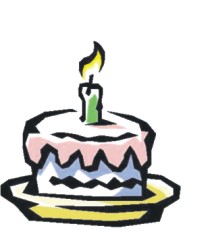Feature
Birthday and all
Mohammad Shahidul Islam
 From our birthday, until we die, From our birthday, until we die,
Is but the winking of an eye.
-William Butler Yeats
History of Birthday observance can be traced back before the rise of Christianity. In pagan culture it was believed evil spirits visited people on their birthdays. To protect the person having birthday from the evil effect, people used to surround him and make merry. A lot of noise used to be created in such parties to scare away the evil spirits. In those times there was no tradition of bringing gifts, and guests attending the birthday party would bring good wishes for the birthday person. However, if a guest did bring gifts it was considered to be a good sign for the person of honour. Later, flowers became quite popular as a birthday gift.
Historians are certain that birthday celebrations are being held for quite sometimes but there are few records for the same. Documented descriptions of birthday celebrations are available only for kings, high-ranking nobility and those who held high positions in the society. In the beginning common men and especially children were unable to celebrate the birthdays. Scholars believe that this difference existed because only the nobility was wealthy enough to throw birthday parties and was considered important enough to be written about. Best known birthday in the history is that of Jesus Christ. For nearly 2000 years since the birth of Jesus in Bethlehem, Christians have been honouring the day as Christmas. About 4,000 years ago King Pharaoh used to celebrate his birthday by giving a feast to his court followers. King Herod is said to have celebrated his birthday by treating lords, high captains and special friends with a special supper party in Galiliee.
Some of the popular birthday traditions and symbols that we see today originated hundreds of years ago. Some believe the tradition of birthday was started by early Greeks who used to take round or moon shaped cake to temple of Artemis - the Goddess of Moon. Others believe the custom of Birthday cake initiated in Germany.
The popular custom of lighting candles on cake is said to have originated because Greeks used to light candles on the cake taken to Artemis to make it glow like a moon. Some though believe the custom originated because of a religious belief that gods lived in the sky and lighted candles helped to send a signal or prayer to the god. Germans are said to have placed a big candle in the centre of the cake to symbolize 'the light of life'. Even today people make silent wishes as they blow out candles. It is believed that blowing out all candles in one breath brings good luck. The word 'cake' is said to have been coined as early as 13th century and is said to have been derived from 'kaka'- an Old Norse word.
In Western culture Birthday Cake is defined as a pastry or dessert served to a person on his or her birthday. Birthday cakes are usually decorated with the person's name and carry a message of congratulations. Candles equal to the number of year's a person has been alive are also placed on the cake. The very popular 'Happy Birthday to You' song has become an indispensable part of birthday celebrations across the world. Today, the song is over a hundred years old. It is still not certain who wrote the lyrics of the song 'Happy Birthday to You'. Happy Birthday song is considered to be a joint work of two American sisters, Mildred J. Hill who was a school teacher in Louisville, Kentucky Experimental Kindergarten and Dr Patty Smith Hill who was the Principal in the same school. The song that was originally composed by two sisters was entitled 'Good Morning to All' but bore the recognizable melody. The tune of the song was first published in 1893 in the book, 'Song Stories for the Kindergarten'. It credited Patty Hill for the lyrics and Mildred Hill for the music.
| 